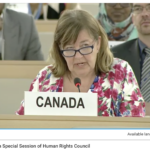This week, Canadian doctor Tarek Loubani was shot in Gaza by the Israeli Occupation Forces (IOF).
Dr. Loubani was shot in both legs. At the time that an IOF sniper gunned him down, there could have been no doubt that Dr. Loubani was a member of a medical team and that he posed no danger to anyone.
As Dr. Loubani wrote:
I was shot toward the end of the morning, and we had already run out of our first supply of tourniquets. I had just resupplied with 8 units, one of them unpacked in my pocket. We were standing well away from the main protest area. The snipers in the three sniper outposts all had clear views of us.
There was no fire or smoke near us. We were standing still, and I was facing in a southerly direction talking to a colleague. The snipers were situated east of us. I was wearing visible full hospital greens. There was no active shooting from the Israelis immediately before or after. There were no protesters in our immediate vicinity.
Dr. Loubani also reported that a paramedic who was a member of his medical team, Musa Abuhassanin, had died after being shot in the chest by an IOF sniper. Musa was killed one hour after he had tended to Dr. Loubani’s gunshot wounds.
Dr. Loubani’s restrained account of these atrocities was quickly picked up by Canadian media. First out of the gate was a local newspaper, the London Free Press (Dr. Loubani lives and works in London, Ontario). The London Free Press is a media asset of the relentlessly pro-occupation Postmedia newspaper empire.
The LFP reported — without any supporting evidence whatsoever — that Dr. Loubani was shot in “clashes” between the IOF and Palestinian protesters. But Dr. Loubani’s own account made clear that there were no “clashes” at the place and time of his shooting.
The LFP’s misleading report was quickly followed by reports from the national media. These media included the Toronto Star, the CBC, the Globe and Mail, and the Canadian Press. None of them misreported that Dr. Loubani had been shot in “clashes”.
Within hours of the national media’s reports, the government of Justin Trudeau finally broke its unconscionable silence on the mass slaughter in the Great March of Return, which began on March 30, 2018. On May 16, two days after Dr. Loubani was shot, the Prime Minister issued a statement declaring that:
Canada deplores and is gravely concerned by the violence in the Gaza Strip that has led to a tragic loss of life and injured countless people. We are appalled that Dr. Tarek Loubani, a Canadian citizen, is among the wounded – along with so many unarmed people, including civilians, members of the media, first responders, and children.
[…]
Reported use of excessive force and live ammunition is inexcusable. It is imperative we establish the facts of what is happening in Gaza. Canada calls for an immediate independent investigation to thoroughly examine the facts on the ground – including any incitement, violence, and the excessive use of force.
On that same day, Foreign Minister Chrystia Freeland called Dr. Loubani. She then made sure that the world knew about it by thanking Dr. Loubani on Twitter for taking the time to speak to her.
In his statement and in her tweet, the Prime Minister and Foreign Minister studiously avoided identifying Israel as the perpetrator of the Gaza slaughter, even though the whole world knows who has been doing the killing: while over 100 Palestinians have died and thousands have been wounded, Israeli forces have suffered no casualties.
Nonetheless, Trudeau’s weak statement caused Canada’s pro-occupation lobby to become apoplectic.
Within hours of the issuance of Trudeau’s statement, the Centre for Israel and Jewish Affairs (CIJA) announced its ‘deep disappointment’ in Trudeau’s statement. Predictably, CIJA placed all the blame for the IOF’s massacres on Hamas. In its announcement, CIJA made no mention of the IOF’s shooting of Dr. Loubani. By contrast, it mentioned Hamas eight times.
On the following day (May 17), the Toronto Sun published an op-ed by B’nai Brith Canada’s CEO, Michael Mostyn, in which Mostyn described Trudeau’s statement as “utterly inexcusable.” Mostyn also demanded that Trudeau apologize to the “Jewish state”. Like CIJA, Mostyn assigned 100% of the blame for the Gaza deaths on Hamas, mentioning Hamas seven times without once referring to the IOF’s shooting of Dr. Loubani.
One day later, B’nai Brith Canada finally acknowledged Dr. Loubani’s shooting, but not for the purpose of criticizing or even raising a question about the IOF’s conduct. Rather, B’nai Brith claimed that Musa Abuhassanin, the paramedic murdered by an IOF sniper one hour after the shooting of Dr. Loubani, was a “Hamas holy warrior.”
Before examining B’nai Brith’s claims about Musa Abuhassanin, let us consider some key facts about Hamas.
Hamas is designated as a terrorist organization by the governments of Canada, the United States and numerous other countries, principally in the West. It is also true, however, that many governments do not consider Hamas to be a terrorist organization. The U.K., Australia and New Zealand designate the military but not the political wing of Hamas to be a terrorist organization. Norway, Switzerland, China, Russia and Brazil do not designate any wing of Hamas to be a terrorist organization.
Prior to 2006, Hamas conducted and encouraged suicide bombings against Israelis. Its targeting of Israeli civilians were unconscionable atrocities for which the perpetrators should be held fully accountable. In 2006, however, Hamas called for an end to suicide bombings. In that same year, it contested the Palestinian elections, winning a large majority in the new Palestinian Parliament.
Immediately following Hamas’s victory in a democratic election, the U.S. administration of George W. Bush secretly plotted to overthrow Hamas and to install Mahmoud Abbas in its place. The plan partially succeeded: Hamas never gained control of the West Bank and acquired nominal control of Gaza. (I say “nominal” because Israel largely determines what exits and enters Gaza and exercises unchallenged superiority in Gaza’s waters and air space.) Although the West treats Mahmoud Abbas as the legitimate President of the Palestinian Authority (PA), Abbas’s four-year term as the PA’s President ended in 2009.
In 2017, former British Prime Minister Tony Blair – no friend of Islamic radicals – declared that the West had been wrong to boycott Hamas after its election win in 2006. For the record, however, I myself do not approve of Hamas. Although Hamas appears to have ended suicide attacks against Israelis over a decade ago, it has nonetheless attempted to achieve a military victory over an enemy that it cannot defeat militarily. My strong belief is that peaceful resistance to oppression is both the most ethical and the most effective way to end oppression. (The Great March of Return, which began on March 30 of this year, might well signify that the leaders of Hamas have finally come to the same conclusion.) Moreover, and quite apart from Hamas’s past use of violence to defeat an enemy that cannot be defeated militarily, reputable human rights organizations have documented serious human rights abuses by Hamas after it won legislative elections in 2006.
This brings us to B’nai Brith’s claim that Musa Abuhassanin is a ‘Hamas holy warrior.’ In order to assess the significance of this claim, it is critical to understand what B’nai Brith does not deny and what it admits.
In its article published yesterday, B’nai Brith did not deny that the IOF killed Musa, nor did it deny that Musa was a paramedic. On the contrary, B’nai Brith’s article itself described Musa as a “paramedic.” In addition, B’nai Brith did not deny that Dr. Loubani was shot in both legs by an IOF sniper, or that Musa treated Dr. Loubani, a Canadian, after he was shot.
In the article, B’nai Brith’s CEO Michael Mostyn asked “Was Abuhassanin really just a paramedic, or was he also undertaking more sinister tasks for the Hamas terrorist organization?” Mostyn failed, however, to cite an iota of evidence that, when he was killed, Musa was in fact “undertaking more sinister tasks”.
In fact, B’nai Brith has adduced no evidence that Musa was armed when he was killed. It has adduced no evidence that Musa was participating in or planning a terrorist attack when he was killed, or that Musa has ever planned or participated in a terrorist attack. B’nai Brith has adduced no evidence to contradict Dr. Loubani’s account that Musa was a “good paramedic” who “was killed while attempting a victim rescue under fire.”
Even B’nai Brith’s suggestion that Musa was a member of Hamas is dubious. B’nai Brith’s main evidence of Musa’s purported membership in Hamas is that Musa was a Captain in the Gazan Civil Defence, which ultimately reports to the Interior Minister Fathi Hammad, a Hamas politician. That, however, does not prove that Musa was a member of Hamas. Hamas rules the Gaza strip and it is therefore likely that all civil servants in Gaza report ultimately to a Hamas official. That does not make all Gazan civil servants members of Hamas any more than it makes every RCMP officer a member of the Liberal Party just because the RCMP ultimately reports to a Liberal Minister of Public Safety, Ralph Goodale.
B’nai Brith also cites the facts that, in an interview with the Palestinian press agency, Musa’s mother wore a Hamas scarf, and that the Hamas flag was wrapped around Musa’s dead body at his funeral. That may well demonstrate that Musa’s mother and those who buried him support Hamas, but it does not necessarily mean that Musa himself was a member of Hamas.
In any event, let us assume, for the sake of argument, that Musa was indeed a member of Hamas. So what? Does this make it lawful and moral for the IOF to have executed Musa while he was acting as a paramedic and was attempting to rescue a victim under fire?
If the immorality of Musa’s execution is not immediately apparent to you, then let us try a thought experiment. Imagine that Musa was killed not in Gaza, but at a Palestinian solidarity protest in Toronto. Imagine that Musa was shot dead by a Toronto police officer who knew Musa to be a member of Hamas, but that, at the time of his shooting by the Toronto police officer, Musa was unarmed, was dressed as a paramedic, and was attempting to rescue an unarmed protester who had come under fire from the Toronto police. What do you expect Canadians’ reaction would be to Musa’s killing? How do you believe Canadians ought to react? Do you believe that the Toronto police officer in my hypothetical should be given a commendation, or do you believe he should be charged with a criminal offence?
The truth is that civilized societies do not behave like the state of Israel behaves in the occupied territories. Civilized societies do not permit the killing of a paramedic who is trying to save a life just because the paramedic happens to be a member of an organization deemed by the government to be a terrorist organization. If membership in that organization is a criminal offence, then its members should be apprehended by law enforcement authorities and tried in a court of law in accordance with due process. They should not be gunned down in cold blood, especially when they are unarmed and are trying to save lives.
What the IOF did to Musa is murder, plain and simple, and no civilized society would tolerate it. But then again, B’nai Brith Canada proved long ago that it is no proponent of civilized behavior – at least, not when the victims are Palestinian.
On May 17, 2018, my Real News colleague Ben Norton interviewed renowned Israeli journalist Gideon Levy. Ben asked Mr. Levy:
The Israeli government’s response is they claim that these are all Hamas supporters, Hamas militants, who are providing cover for Hamas. What is your response?
Mr. Levy answered:
This is so ridiculous. I mean, let’s go step by step. The fact that they are Hamas supporters, let’s say they are Hamas supporters, does it mean that Israel has the right to execute them, especially when they are not armed, when they don’t endanger anyone? And secondly, if they are Hamas activists, does it make it legitimate to kill any soldier in this case, any Israeli soldier? Because by this Israel is saying that anybody in uniform or anybody in there with weapons, it’s totally legitimate to assassinate him. So it goes in both directions. But, obviously, Israel knows the truth, and the truth is that most of them are non-violent and unarmed protesters who have nothing to lose, who go to the fence not because Hamas brought them there. They go to the fence because they starve, because they have no perspective for the future, because they have nothing in their life, and nothing to lose in their lives. And this for Israel is too hard to cope with.
Here, Mr. Levy is not simply expressing a moral principle. He is also expressing a legal principle.
On April 26, 2018, for The Real News Network, I interviewed two researchers of the human rights organization, Al Haq. One of them, Rania Muhareb, holds a Masters of Law in International Human Rights and Humanitarian Law. In that interview, I asked Ms. Muhareb:
Let’s suppose, just for the purposes of argument, that one or more of these protesters who have approached this fence are, in fact, supporters or even members of Hamas, but that they are unarmed, so that they’re in no position to actually inflict injury upon the soldiers on the other side of the fence. What does international law have to say about how the occupying army can conduct itself in the circumstances? Does the mere fact that an unarmed protester is a member of Hamas confer a right on the occupying army to shoot the protester?
Ms. Muhareb answered:
As you know, these are peaceful protests, as my colleague has just confirmed. They are peaceful protests of civilians, and even if there are members of Hamas within the protest, the fact of them being unarmed offers them protection under international law. And Israel, as the occupying power, in the policing of a peaceful assembly, such as The Great March of Return, must be guided by the principles of necessity and proportionality in the use of lethal force. This means that the occupying forces may only use lethal force when absolutely necessary, in order to protect life. And this is clearly not the situation that we’re talking about here. And the evidence of this is that the International Criminal Court even came out and said, Israel may be committing war crimes in targeting peaceful civilian protesters in the Gaza Strip. And this is exactly what we are documenting, as well, at Al-Haq. We are documenting excessive use of force, but not only excessive, also premeditated and intentional use of force. This means that there is an actual order given to Israeli soldiers to use the force that we have document. And we see this in the casualties and the types and nature of injuries that my colleagues are discussing and are documenting on the ground.
What does B’nai Brith’s article on Musa Abuhassanin say about international law?
Absolutely nothing.
In fact, B’nai Brith’s article does not explicitly address the morality – let alone the legality — of executing a Hamas member who is acting as a paramedic and who is attempting to rescue a person under fire. B’nai Brith simply never tells us what moral or legal conclusions we should draw from its claim that Musa is a ‘Hamas holy warrior.’ Rather, it leaves entirely unanswered the obvious question: so what?
The reason for its silence, I would suggest, is that B’nai Brith knows that most Canadians would recoil in horror at an explicit assertion that Israel’s occupying army is entitled to execute a paramedic who is attempting to rescue another human being just because the paramedic is a member of Hamas.
Yesterday, after reading B’nai Brith’s article, I perused the comments on the article appearing on B’nai Brith’s Facebook page. One of the commenters wrote “regardless of [Musa’s] affiliation, he saved a Canadian. That should be celebrated.”
Dr. Tarek Loubani is an inspiring individual. He is also my friend. I am deeply grateful that Musa gave his life to save wounded persons in Gaza, including my friend. At the same time, I believe we should honour Musa’s sacrifice not because he helped a wounded Canadian, or because he helped my friend, but because he died while seeking to protect his fellow human beings. All persons who oppose oppression by peaceful means are equally deserving of our love and our humanity, whether they be Canadian, Jewish, Palestinian or of any other ethnicity, nationality or religion.
That is the lesson of Musa Abuhassanin’s death.






[…] By Dimitri Lascaris. […]
[…] the true perpetrators of these atrocities. No, the real reason is that Justin Trudeau came under a withering assault from Canada’s pro-occupation lobby the moment that he waded into the waters of […]
[…] and as I have written elsewhere, even if DiManno had demonstrated that Hamas had organized and participated in the Great March of […]
[…] sniper as he stood in the open wearing medical apparel. The medic who treated Doctor Loubani, Musa Abuhassanin, was murdered by an Israeli sniper one hour […]